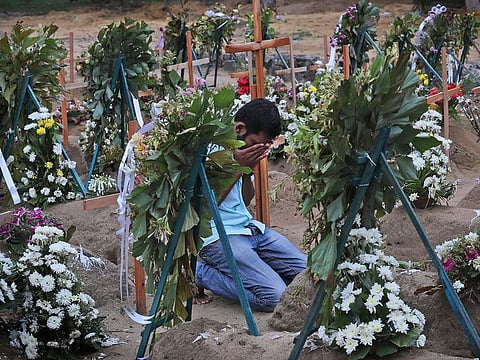Tears and troops on the streets as Sri Lanka mourns suicide bomb dead
Churches remain shut as Christians say prayers of grief in private

Colombo: Sri Lanka’s churches remained shut Sunday forcing Christians to say prayers of grief in private over the Easter suicide attacks that the country’s Roman Catholic leader called “an insult to humanity”.
Fearing a repeat of the Easter Sunday bombings of churches and hotels in which 253 people died, the Archbishop of Colombo, Cardinal Malcolm Ranjith, held a private mass after cancelling all public services.
Amid heavy security imposed across the country, a vigil was also held outside St Anthony’s Shrine in Colombo at 8.45am, the moment the bomber struck the church, killing dozens of worshippers.
“Today during this mass we are paying attention to last Sunday’s tragedy and we try to understand it,” the cardinal said at his official residence, where President Maithripala Sirisena and Prime Minister Ranil Wickremesinghe were among the small congregation.
“We pray that in this country there will be peace and coexistence and understanding each other without division,” he said.
“What happened last Sunday is a great tragedy, an insult to humanity,” he added.
Stuck in time
At exactly 8.45am, the singing of hymns by scores of people outside St Anthony’s church stopped and the bells tolled. The hands on the tower clock are still fixed at the time of the blast.
“I come to this church every Sunday, it feels like my second home,” said Dharshika Fernando, 19, fighting back tears.
“It feels like people blasted my own home.”
Thousands of Sri Lankan troops remained on the streets, guarding churches and mosques for the symbolic day.
Security forces also carried out new arrests, a day after at least 15 people were killed in a raid on a jihadist hideout where suicide bombers blew themselves up.
Police said they arrested two top suspects in connection with the Easter bombings in central Nawalapitiya on Saturday night, taking the total number in detention to more than 100.
Authorities say they are seeking about 140 Daesh-influenced radicals in all.
The latest two, Mohammad Saadik Abdul Haq and Mohammad Saahid Abdul Haq, were on a list of six “most wanted” radicals issued on Thursday.
They were wanted for the December 26 desecration of Buddha statues at the central town of Mawanella, the act that first brought to prominence the National Thowheeth Jama’ath (NTJ) group, which has been blamed for the Easter bombings.
Schools stay closed
The previous night, three men set off explosives killing themselves, three women and six children after a showdown with security forces near the eastern town of Kalmunai.
Police said three other suspected suicide bombers were shot dead by security forces outside the hideout. A civilian was also killed in crossfire.
Daesh group, which claimed responsibility for the Easter bombings, said the three men who blew themselves up at Kalmunai were members of the militant group.
Kalmunai is in the same region as the hometown of the jihadist Zahran Hashim, who founded the NTJ group.
Police said the widow of Hashim and their child were wounded in the Kalmunai raid.
“The woman and her four-year-old daughter are now being treated at a government hospital,” police spokesman Ruwan Gunasekera told AFP.
Gunasekera said they were carrying out DNA tests to establish if Hashim’s father was among those who perished at the safe house.
Another raid in the region targeted a house where authorities said Hashim and the other suicide bombers filmed a pledge of allegiance to IS before staging their attacks.
The video was shown by IS when it made its claim of responsibility.
Footage shown on state television showed explosives, a generator, a drone and a large quantity of batteries inside the converted studio. An IS flag and uniforms were also found, police said.
The firebrand cleric is said to have died in the attack on the Shangri-La, one of three Colombo hotels hit by suicide bombers.
Sirisena used emergency powers to officially ban the NTJ and a splinter group identified as Jamathei Millathu Ibraheem (JMI) on Saturday, his office announced.
In a sign of the tensions, the reopening of schools across Sri Lanka scheduled for Monday has been put back one week. Authorities have also kept up a 10.00pm to 4.00am nationwide curfew.
Sign up for the Daily Briefing
Get the latest news and updates straight to your inbox



